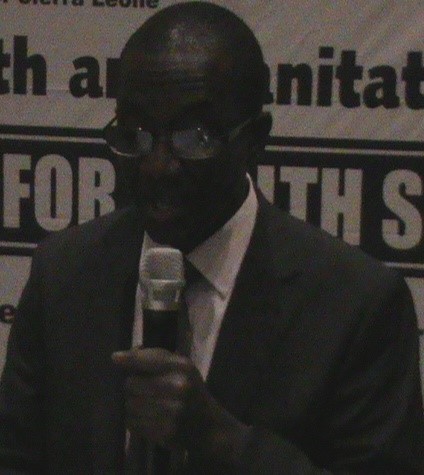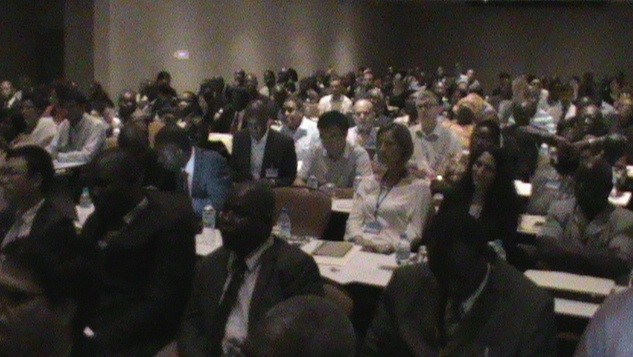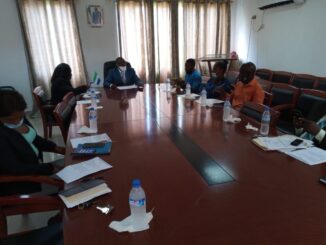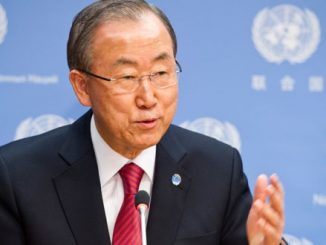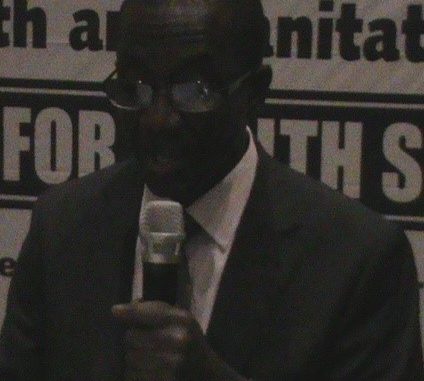
Freetown, June 2, 016 (MOHS) – The Ministry of Health and Sanitation in collaboration with WHO, UKaid and Clinton Health Access Initiative (CHAI) has organized a two-day Human Resource for Health in Sierra Leone Summit at the Radisson Blu Hotel in Freetown on the theme: “Building a Resilient Health Workforce for Sierra Leone”.
Delivering his keynote address at the opening ceremony, Health and Sanitation Minister, Dr. Abu Bakarr Fofanah noted the challenges in the health sector and the 13 targets of the Sustainable Development Goals (SDGs) devoted to health and also linked to many of the other non- health goals and targets in the sustainable development goals reflecting the intricate relationship between health and socio-economic development.
Health and Sanitation Minister, Dr. Abu Bakarr Fofanah
Commenting on President Koroma’s Recovery priorities after the Ebola virus disease outbreak, Dr. Fofanah said whilst in the verge of ushering into second phase of the Recovery Plan, they are standing on what he referred to as a thresholds of two new eras: the end of the Millennium Development Goals (MDGs) as well as the end of the early post Ebola Recovery period and the beginning of the second phase of the Recovery. These transition period he told the audience are seen as an opportunity for all to sit back and take stock of the significant trends that have defined the country’s health system in the past under the MDGs before the outbreak, noting the achievements, recognizing the challenges, highlighting the lessons learnt along the way, focusing on the many uncompleted agenda.
The human resource for health component of the health system building blocks, the Minister said is unique and needs to be addressed in more sustainable way.
Dilating on the strength of the human resource for health pillar, Dr. Fofanah maintained that this is the only component without which investments in the others such as drugs, medical supplies, technology, infrastructure and a lot more is unlikely to yield the desired health outcomes. The Minister told his audience that it is in recognition of this fact the government of Sierra Leone through the Ministry with strong support from partners that they decided to organize the summit which also attracted participants from different African countries including neighbouring Liberia.
According to the WHO benchmarks, Sierra Leone with an estimated population of about six million, the Minister said requires a minimum of 1, 200 medical doctors with less than 350 Sierra Leonean doctors registered with the Medical and Dental Council of Sierra Leone. The shortage of doctors he further disclosed has already reached and surpassed critical proportions with the same situation for nurses, midwives and others.
PARTICIPANTS
The situation Dr. Fofanah lamented has since been worsened by the Ebola virus disease, adding that the summit was designed to further guide and support the implementation of the existing Sierra Leone Human Resources for Health Strategic Plan. Central to any strategy, the minister outlined leadership and governance for effective stewardship of human resource for health development, education and training in line with integrated people centered service delivery, investment in data and evidence for sound decision making, planning guided by a thorough understanding of health labor markets, deploying health workers where they are needed and harnessing the private sectors among others.
Highlighting the Ministry’s current initiatives in line with key challenges, Dr. Fofanah catalogued the establishment of a University Teaching Hospital to formalize what he referred to as the nexus between the Medical School and the service hospitals, the Postgraduate College for training all cadres of health personnel at specialist level, the School of Clinical Services to address the middle level manpower, and the establishment of a Community Health Workers Hub with the Directorate of Primary Health Care
President Koroma, Dr. Fofanah opined is desirous of leaving a legacy behind when he leaves office, and health being one of his priorities he is deeply committed to the hosting of the summit and its successful completion
In his statement, the Deputy Minister of Finance and Economic Development 1, Mr. Patrick Conteh expressed his Ministry’s interest in the development of a formidable Human Resource Health Policy that will enhance the sustenance of a strong human resource base in the health sector.
He said a strong health human resource base will no doubt deliver a resilient and health workforce for generation of much needed wealth and poverty alleviation, adding that with the expertise and wealth of experience of both national and international participants at the forum, the vital objectives will be realized.
Mr. Patrick Conteh told the gathering that one of the conclusions reached at the recently concluded ADB annual meeting is that the mixed effects of limited access to quality education, health, nutrition, technology and innovation are impediments to accelerating Africa’s growth and entry into higher value-added areas of production and competitiveness.
He assured the audience of the Ministry of Finance’s unflinching support and commitment to moving forward all health related development issues and programmes enshrined in the Agenda for Prosperity and Post Ebola Strategy.
The Minister of Local Government and Rural Development, Mr. Maya Kaikai recalled the horrible situation of the Ebola virus disease which not only affects health personnel but also on the youth population that forms the highest portion of the country’s human resource base.
Minister of Local Government and Rural Development, Hon. Maya Kaikai
He said prior to the Ebola virus disease, there had been capacity gaps in the health sector especially the middle level cadre.
Hon. Maya Kaikai reiterated that capacity development in the medical sector, especially for nurses and other medical officials is very crucial for effective and efficient service delivery.
He described the summit as timely because it would ensure sustainable health service delivery, the need to improve or overhaul the health service strategy particularly the Human Resource landscape in the country.
The Local Government Minister thanked the Ministry of Health and Sanitation for organizing the summit, and appealed to the Ministry to give due attention to the deployment of trained health personnel in the rural communities.
The Chief Medical Officer, Dr. Brima Kargbo told his audience that the Ministry of Health has invested heavily in the health workforce since the beginning of the Free Health Care Initiative,
adding that the health workforce has more than doubled in size since 2010, which is a testimony to the commitment of the government to provide quality health care to all Sierra Leoneans.
Dr. Kargbo informed his audience that at present, the Ministry now employs more than 10,000 health workers nationwide, more than 1,300 work stations including Hospitals, Peripheral Health Units and Administrative Officers, adding that despite having the largest workforce in the civil service, there are still a number of gaps in the human resources across the different cadres.
He reiterated his commitment towards building a resilient health system, stating his office position in leading the health sector component of the 10-24 months plan, designed to help save the lives of 5,000 children and 600 women over the course of the next 14 months.
The Permanent Secretary and Chairman for the opening ceremony, Mr. David Banya underscored the importance of the summit as it will influence informed policy decisions for strengthening of the health care delivery in Sierra Leone.
He said as the country emerges out of the Ebola epidemic, every effort by the government and development partners is required to ensure that the health care delivery system is made robust to respond very swiftly to any health situation.
Other highlights includes statement by the Minister of Education in Liberia George Werner, presentations on the roadmap and objectives for Sierra Leone’s refreshed human resource for health policy and strategic plan, learning from past experience in Sierra Leone before during and after the civil war, and perspectives from other developing countries: Liberia, Rwanda, Ethiopia, Zambia, Ghana and Malawi.
JAK/KK/MOHS/SLENA

